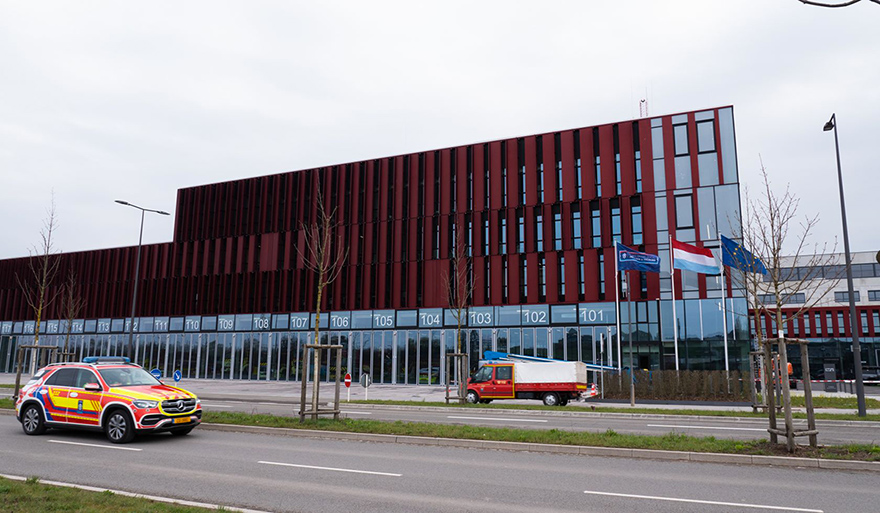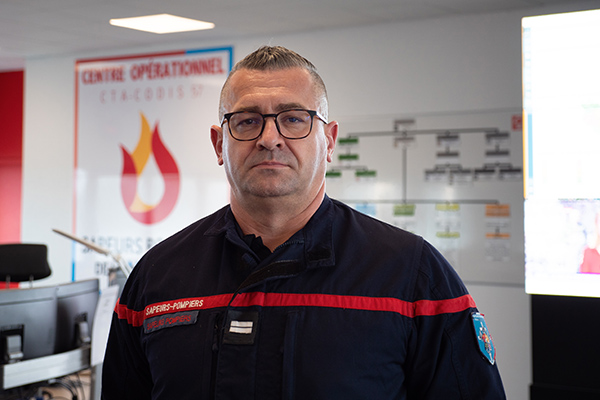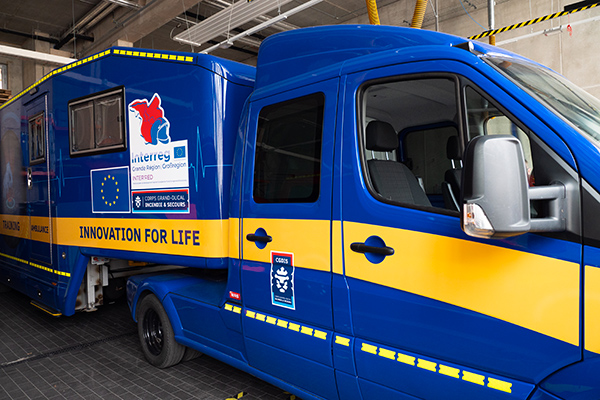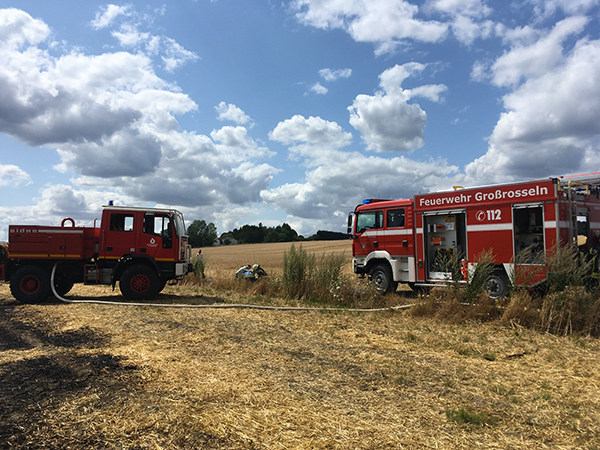"Firefighters without borders": breaking down national barriers in the Greater Region
INTER’RED, a project funded by the European Union, is encouraging collaboration between the emergency services of Moselle, Meurthe-et-Moselle, Luxembourg, Germany and Belgium.

Luxembourg City (Luxembourg), Sarreguemines-Bitche (France)
When Emmanuel Cycon responded to an emergency call-out on 11 October 2006, he knew he had to fear the worst: a TER train had collided head-on with a goods train in Zoufftgen, just 36 metres from the border between Luxembourg and France. The debris was strewn across the tracks and into Luxembourg territory. Around thirty people were trapped inside the wreckage. But the young firefighter was taken aback by the number of emergency personnel at the scene. The motorway was jammed with fire engines. A French helicopter appeared, followed by two from Luxembourg, "like in a film".
150 firefighters, 100 gendarmes, fifty rescue vehicles, seven extrication teams: the emergency responders of both countries had been mobilised en masse, leading to delays in tackling the situation. "We were either treading on each other's toes, or each side was just doing its own thing. It was difficult to coordinate a course of action," recalls Cycon, now a Lieutenant First Class in Metz.
Work as a team
"At first we had the feeling that the French had taken the lead in the operation and didn't really want us involved in it," says Steve Mack, who, as a volunteer firefighter in Luxembourg, was also called out to the scene. 16 years later, and now director of the National Institute for Rescue Training, he recalls the collegiality that quickly developed between the teams from the neighbouring countries: the French colleagues who set up a large mobile kitchen, the rescuers who slept on the spot, refusing to leave until all the victims had been removed.
With 6 dead and 23 injured, the toll was heavy, and serious lessons needed to be learned. "We firefighters could not allow failures of mutual understanding to go on slowing down our responses," says Franck Laffont, now Chief Warrant Officer in Metz, who also attended the accident.

Everyone agrees that the emergency services of both countries would handle an accident such as Zoufftgen far better now. Cross-border relations are greatly improved, largely thanks to INTER’RED, a project funded by the European Regional Development Fund to the tune of €3.8 million, nearly 60% of its total budget. Set up in 2018, INTER’RED aims to combine the resources and expertise of the emergency services of Luxembourg, Belgium, France and Germany in order to optimise joint interventions and improve rescue services in the Greater Region.
Walking through the brand-new premises of the National Fire and Rescue Centre in the south of Luxembourg, Steve Mack proudly points out the state-of-the-art equipment. Inside a hangar is a fake six-storey building used for firefighter training. A train carriage in a training tunnel allows rescuers to practise their response to railway accidents. And in one of the many garages is a new acquisition, purchased with INTER’RED funds: a mobile training ambulance in the back of a large truck painted in the colours of Europe, complete with cameras to allow the trainees’ performance to be evaluated.
"It is available to all partners, as is the driving simulator we have also purchased," says Mack. The fire services in the neighbouring countries are all eager to practise on this new, shared equipment, as well as to offer their own: the Belgians have bought two drones, a training car and a mobile command post, expected to be operational by October 2022; the Germans are developing a platform for the joint-handling of emergency calls in order to overcome language difficulties and facilitate cross-border assistance.

Fires without borders
"Emergencies and human distress do not stop at the border," says Captain Olivier Lourson, 47, Commander of the Sarreguemines-Bitche company in Moselle, on the French-German border. He jokes that he started his career as a firefighter "the same way Obelix started his: I fell into it as a child.”
His 31-year career has made him only too aware of the cross-border issues and practical obstacles that can slow down rescue efforts. German hydrants that are incompatible with French fire engines are just one example. "In the commune of Freyming-Merlebach there is a street whose right-hand side is in France and left-hand side is in Germany: so if there’s a fire on the left-hand side – I don't go there?" he asks wryly. Different highway codes, different hierarchical structures and mobile networks that cross the border are all examples of the kinds of constraint that complicate life for firefighters, and which INTER’RED was set up to tackle.
The French fire service has finally found a permanent fix to the problem of hydrant incompatibility, with the purchase of special connectors: these were recently put to use on a wildfire in Germany, where French all-terrain vehicles were supplied with water by their German counterparts. Even more than the equipment, though, project members value the exchanges with their colleagues in neighbouring countries.
In September 2021 Emmanuel Cycon and Franck Laffont travelled to Koblenz, in Germany, for a training course on operational ventilation, a technique for evacuating smoke in the event of a fire. During the two-hour journey, their concerns grew: "Our two countries have a history, and we know that we have different standards. We expected things to be quite awkward," recalls Franck Laffont.
The guests from Luxembourg had their concerns, too. "But within half an hour, we are all firefighters, we all do the same job, we all have a story to tell," says Steve Mack with a smile. Exchanges like these have proved so fruitful that Emmanuel Cycon is already looking forward to the next joint training sessions: "Adaptation and the constant search for new solutions are at the very heart of our job. And they are only possible through exchanging information and seeing how things are done elsewhere: it has allowed us to open our eyes."

Direct contacts for speedier interventions
There has been no shortage of opportunities to put these strengthened relationships into practice since the start of the INTER’RED project: "We are called to incidents in Germany nearly three times a week, French colleagues brought rescue and clearing units when we were hit by a tornado, and last summer there was flooding in Belgium," says Steve Mack.
Even when INTER’RED is not directly involved, Emmanuel Cycon is convinced that the contacts made at the meetings play a crucial role: "Communications channels are shorter now: the chief knows what resources he needs, and he knows what everyone has and who he needs to call, so he just needs the official agreement.”
Even when borders were reappearing across Europe during the Covid-19 pandemic, the emergency services of the Greater Region continued providing their mutual assistance, transporting French patients to Germany and Luxembourg, for example. The number of INTER’RED meetings had to be reduced and the deadline for completion of the project was put back a year, to the end of 2022, but nevertheless, the project has been positive on all fronts.
"A lot has been achieved already, but there are still so many more areas we could be cooperating in that this project could last 10 years," says Captain Lourson: "It has made our daily life easier, but it has also allowed us to aim higher." Firefighters continued to check in with each other across the borders throughout the Covid-19 crisis, he says: "INTER’RED has led to friendships, too."
 This article was produced as part of the Union Is Strength competition, organised by Slate.fr with the financial support of the European Union. The article reflects the views of the author and the European Commission cannot be held responsible for its content or use.
This article was produced as part of the Union Is Strength competition, organised by Slate.fr with the financial support of the European Union. The article reflects the views of the author and the European Commission cannot be held responsible for its content or use.